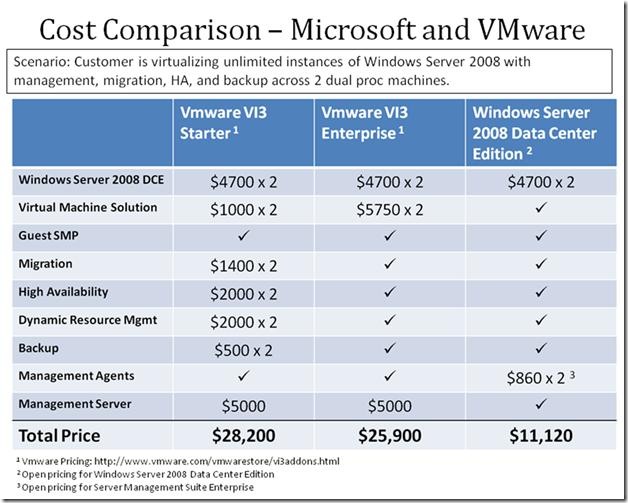Virtualisation - Why would you not choose Microsoft Virtual Server..?
I recently received some interesting internal marketing information regarding how the Microsoft Virtualisation products are now so much better than what VMWare has to offer. There are a couple of points that were mentioned that I thought I would share here with everyone.
This table should be nice and clear!
Windows Server Hyper-V
Windows Server 2008 Hyper-V is the hypervisor-based virtualisation feature included as part of Windows Server 2008. It contains everything needed to support machine virtualisation. It allows you to virtualise multiple operating systems — Windows, Linux, and others — on a single server and fully leverage the power of x64 computing. With virtualisation built into the operating system it will run faster and work better with your hardware right from the start.
More information: www.microsoft.com/windowsserver2008/virtualization/default.mspx
Some quotes to read:
- Today, VMware has about 80 percent of the virtualization market. By 2011, I think it may be lucky to have 8 percent of the market. There's a lot more competition coming. Microsoft, after blowing hot and cold on virtualization, has desired virtualization as an essential part of its future. (<www.eweek.com/article2/0,1895,2216435,00.asp)>
- Microsoft has done a good job of integrating its virtualization services into the same framework of easy-to-manage server roles that govern Windows Server's other key functions, and I found that Viridian's facilities for creating and monitoring virtual instances compared well to rival products from VMware and XenSource. (<www.eweek.com/article2/0,1895,2189866,00.asp)>
- But the server virtualization leader lacks one thing that second banana Microsoft Corp. has as of Thursday: a system management platform that gives IT administrators a single simultaneous view of their physical and virtual servers. (How Virtual Machine Manager may help Microsoft compete with VMware - Eric Lai, 09-07-2007)
- “System Center is a much broader infrastructure than [VMware's] Virtual Infrastructure," says Gartner analyst Thomas Bittman. (<www.informationweek.com/story/showArticle.jhtml?articleID=203101825> )
Comments
Anonymous
January 01, 2003
"When Hyper-V finally makes its debut late next year, then we can really discuss the merits of Microsoft’s hypervisor-based solution against the other hypervisor-based solutions, including VMware, that are available on the market" Which is exactly what the table is doing based on facts readily available and also on the features that will be in the Hyper-V.Anonymous
January 01, 2003
PingBack from http://blog.windowsvirtualization.com/virtualization/it-has-started-the-virtualization-tla-warsAnonymous
January 01, 2003
Chris, This is the million dollar question! I would say Hyper-V but you need to assess both solutions to see which one is best. If you want more information, contact your Microsoft Account Manager, s/he will be able to provide more info. DanielAnonymous
December 12, 2007
Have you ever actually used VMware VI3? Read this. http://blog.scottlowe.org/2007/12/11/ok-i-had-to-comment-on-this/Anonymous
December 12, 2007
Given Microsoft's history, I wouldn't really count on: 1- Hyper-V shipping in 2008 2- Hyper-V being able to provide all it's claimed features when it is first shipped Why would I not chose Virtual Server? How about the fact that it currently doesn't provide the features you are using for comparison in the table. Why would I want to make a strategic investment on a product that hopes to have in 1 year from now features similar to what VMware VI3 currently has? I think the odds are pretty good that by the time Hyper-V ships, VMware will have plenty of additional advantages that will keep once again well ahead of the Microsoft offering. When comparing the 2 products, it is probably wise to keep in mind the saying: "you get what you pay for".Anonymous
December 12, 2007
Anyone who actually works in a production IT environment probably knows how foolish it is to try to do an apples-to-apples comparison between an already-shipping product with a not-yet, much-delayed product. As interesting as it looks pre-release, I wouldn't bet my career on Microsoft shipping Hyper-V on-time and fully functional.Anonymous
September 12, 2008
We are looking into virtualisation which is the best vendor?
